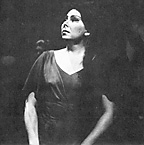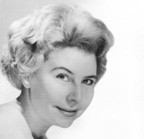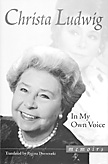Christa Ludwig: Looking Back by Philip Anson
/ November 1, 1999
Version française...
Singing for me was a job. I don't miss it," legendary German mezzo-soprano Christa Ludwig told me in an
interview in New York last week, where she was promoting her autobiography Christa Ludwig : In My Own
Voice, an English translation of the German memoirs ...und ich ware so gern Primadonna gewesen, originally
published in 1994. "Now I feel incredibly free to eat, talk and as much as I want," she smiles, and who could
doubt such a candid confession from a singer who has always been admired for her frankness as much as for her
vocal splendour?
 Ludwig, who is now 71 but looks more like 50, has a strong, opinionated manner that is charmingly, typically
Germanic. She may not miss singing, but she is sincerely missed by her fans, hundreds of whom attended her
Manhattan book signings and lectures. Ludwig retired in 1994 after a 49-year professional career. She had been a
regular at the old and new Metropolitan Opera houses between 1959 and 1993 and considered it her second home.
Here as everywhere she is loved and remembered for her passionate performances and recordings of all the major
mezzo roles and several soprano roles as well, with an emphasis on the German repertoire, especially Strauss and
Wagner. She was also one of the finest lieder interpreters of the century, and made headlines as one of the few
women brave enough to record Schubert's Die Winterreise. Ludwig, who is now 71 but looks more like 50, has a strong, opinionated manner that is charmingly, typically
Germanic. She may not miss singing, but she is sincerely missed by her fans, hundreds of whom attended her
Manhattan book signings and lectures. Ludwig retired in 1994 after a 49-year professional career. She had been a
regular at the old and new Metropolitan Opera houses between 1959 and 1993 and considered it her second home.
Here as everywhere she is loved and remembered for her passionate performances and recordings of all the major
mezzo roles and several soprano roles as well, with an emphasis on the German repertoire, especially Strauss and
Wagner. She was also one of the finest lieder interpreters of the century, and made headlines as one of the few
women brave enough to record Schubert's Die Winterreise.
Ludwig's book reflects her strong principles, high standards, wry sense of humour and eye for human foibles.
Singers' autobiographies are rarely great works of literature. They tend to get bogged down in boring facts,
embarrassing confessions, old vendettas, or self-glorifying anecdotage. Christa Ludwig strikes a happy medium,
sketching the outline of her personal and professional life, with topical chapters on her favourite conductors, opera
houses, and roles. She explains the mysteries of the voice, and dispenses plenty of wise advice to the young.
"I wanted to write a book that would help young singers understand the business. Many of them think it's all
glamorous, but it is not an easy career," she cautioned. Her own life bears that out. Born in Berlin in 1928 to a
musical family, she grew up in Aachen where her father was a theatre manager, director and singer. Her mother
was a mezzo who ruined her voice singing soprano parts, and gave up her career to coach her talented daughter.
Christa made her professional opera debut in Giessen at 17 and learned her trade as a member of the Frankfurt
Opera from 1946-1955. Her big break came in 1955 when conductor Karl Böhm invited her to debut at the
Salzburg Festival and the Vienna State Opera. He became her mentor, despite the fact that she couldn't see his
notoriously understated beat and had to depend solely on her ear.
As Ludwig explained, her book avoids gossiping about her colleagues because "None of the stories are nice. I
couldn't tell them." Nevertheless, she details Corelli's debilitating stage fright, Zinka Milanov's advice on
menopause, Paul Schoffler's attempts to seduce her, and her own superstitious dependence on horoscopes.
Singers' and conductors' vanity is one of Ludwig's favourite targets and she tells some wonderful stories. When
Milanov heard that her rival Tebaldi had sprained her ankle jumping at the end of Tosca, Milanov trumpeted, "I
always said Tebaldi couldn't sing Tosca!" When the retired diva Lotte Lehman was introduced in Salzburg to
Ludwig after Ludwig sang the Marschallin (one of Lehman's great roles), the older woman said, "My dear, I
congratulate you on your wonderful performance - in the Missa Solemnis." When Ludwig told the jealous Böhm
that Karajan had invited her (a mezzo) to sing the demanding soprano role of Isolde, he hissed, "It's a criminal
thing to ask ... but with me, you could sing it." Then there were the eccentrics, like accompanist Eric Werba, who
insisted she had to wear red to sing Hugo Wolf songs, and blue or white for Schubert.
Ludwig is refreshingly honest and non-judgmental about the highly charged sexual atmosphere of the opera
house. When she first auditioned for the Vienna State Opera, she wore a revealing dress because, her mother told
her, men "see first and hear second." Yet after a recital in a low-cut dress, she was abashed to get a postcard from
an offended Catholic priest who advised her to "honour your body, because it is a holy shrine." Ludwig's early
triumphs in trouser roles like Octavian in Der Rosenkavalier, the Composer in Ariadne auf Naxos, and
Cherubino in Le Nozze di Figaro were almost against her will. She hated wearing the rubber Busenquetsche, or
bosom crusher, to flatten her chest. "I was too curvy to play pants parts for American audiences, who prefer boys
to look like boys, but Europeans find a girl playing a boy sexy," she explained. "Part of the appeal of [Der
Rosenkavalier] lies in the spicy situation in which the two lovers are both played by women," Ludwig elaborates
in her book. "In European countries, this is sometimes too well understood, and when I sang the role [of
Oktavian], I received letters fairly often from lesbians who thought I was one of them." But for all the badinage,
Ludwig seems to have regarded the opera world from a safe distance, with some distrust. "Colleagues are simply
not friends," she concluded.
 Socially, Ludwig was a late bloomer, living with her dominant Prussian mother, and avoiding parties and dances
in order to protect her voice. She was mystified in her twenties when a stage director told her that it would drive
men wild if, as Carmen, she made her entrance eating a banana. "I had no idea why at the time," she says. She
mentions a few adolescent pashes, but no adult affairs outside wedlock, and warns against the perils of singers
marrying singers. She married her first husband, baritone Walter Berry in 1957 when she was 29, giving birth to
her first and only child Wolfgang (now Mark, a composer of German musicals) two years later. By her own
admission she was a negligent mother, always on the road. In the early 1970s she suffered a serious vocal crisis
(burst capillaries on the vocal cords) and divorced Walter Berry. Socially, Ludwig was a late bloomer, living with her dominant Prussian mother, and avoiding parties and dances
in order to protect her voice. She was mystified in her twenties when a stage director told her that it would drive
men wild if, as Carmen, she made her entrance eating a banana. "I had no idea why at the time," she says. She
mentions a few adolescent pashes, but no adult affairs outside wedlock, and warns against the perils of singers
marrying singers. She married her first husband, baritone Walter Berry in 1957 when she was 29, giving birth to
her first and only child Wolfgang (now Mark, a composer of German musicals) two years later. By her own
admission she was a negligent mother, always on the road. In the early 1970s she suffered a serious vocal crisis
(burst capillaries on the vocal cords) and divorced Walter Berry.
Ludwig's relations with men suffered from her memories of her macho, Nazi, philandering father who abandoned
her mother in 1946 for a younger woman. As a singer, her parents' divorce was the best thing that could have
happened to Ludwig, since her mother became her live-in companion, critic and coach. This freed Ludwig to
concentrate on her art. But, for the next 40 years she was under her mother's control. Only when Ludwig was
nearing 60 years of age, in 1988, did she have the strength to cut the maternal apron strings and fully devote
herself to her second husband, French stage director Paul-Emile Deiber. Five years later, in 1993, the 94-year-old
Mrs. Ludwig died. At last Christa was free to be her own woman. Today she lives near Cannes in the south of
France, where, she says with deep spiritual contentment after a lifetime of struggle, "the sky is blue and the sea is
bluer."
 |
Christa Ludwig : In My Own Voice
306 pp. $30. (U.S.)
Limelight Editions. ISBN 0-879102810
Distributed in Canada by Scholarly Book Services |
Christa Ludwig Selected Discography
-Lieder. Erik Werba, piano. Salzburg Festspiel 1963/68. Orfeo
C 331 931.
LISTEN: Mahler: 1.
Ich Ging Mit Lust, 2.
Ich Bin Der Welt Abhanden Gekommen
-Opera Highlights. Salzburg Festspiel 1955-1974. Orfeo C 365
941.
-Christa Ludwig: A 70th Birthday Tribute. RCA 09026 689512.
-Christa Ludwig: A Tribute. Deutsche Grammophon 459-3352.
-C. Ludwig: Les Introuvables. EMI ZDMD 7640742.
LISTEN:
Brahms: Opus
94: no 4, Sapphische Ode (with Gerald Moore)
Brahms: Opus
3: no 1, Liebestreu (with Gerald Moore)
Mahler: Lieder
und Gesänge, vol 1: no 1, Frühlingsmorgen (with
Gerald Moore)
Mahler: Des
Knaben Wunderhorn: no 1, Der Schildwache Nachtlied (with
Gerald Moore)
Schubert: An
die Musik, D 547 (with Geoffrey Parsons)
Schubert: Ganymed,
D 544/Opus 19 no 3 (with Geoffrey Parsons)
Saint-Saëns: Une
flûte invisible (with Geoffrey Parsons & Douglas
Whittaker)
-Bartók: Bluebeard's Castle. Kertész / London
Symphony. Decca 4663772.
More Sound Samples
Verdi: Requiem, Berlin Philharmonic Orchestra conducted by
Herbert von Karajan,
Liber
scriptus
Mahler: Das Lied von der Erde, Philharmonia Orchestra conducted
by Otto Klemperer, EMI Classics - #66944
2.
The Song Of The Earth: II. The Lonely One In Autumn
4.
The Song Of The Earth: IV. Of Beauty
Version française... |
|


